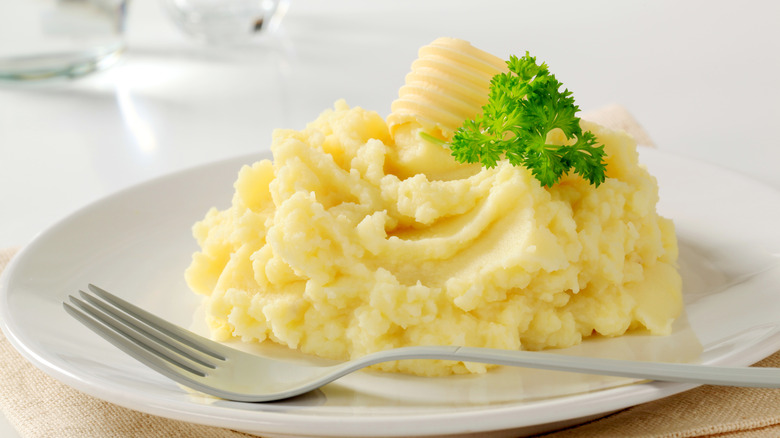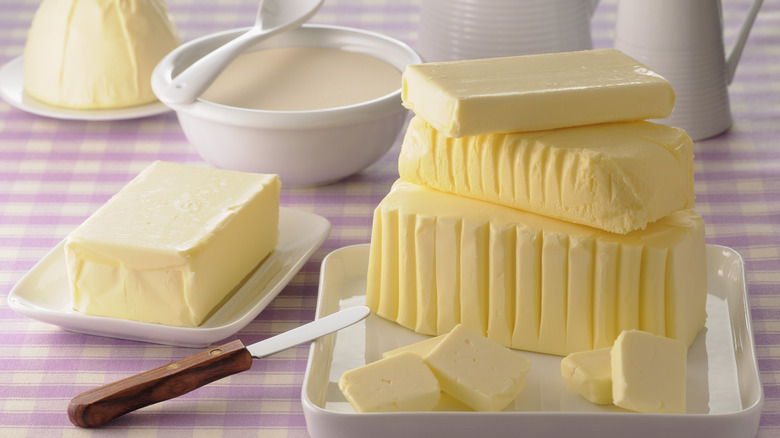The Top Tip You Need For The Best Thanksgiving Mashed Potatoes
With all the talk of turkey and pie at Thanksgiving, it's easy to overlook the all-star side dish that holds the whole meal together: mashed potatoes. Whether you like 'em lumpy, or whip them in a mixer for maximum smoothness, your holiday table is simply incomplete without a heaping bowl of creamy spuds. Mashed potatoes are one of those recipes that are deceptively simple; you only really need boiled potatoes, milk or cream, butter, salt, and pepper. How you handle your ingredients makes a big difference, however, especially the dairy. If you're not already warming up your milk and butter, it's time to start.
Mashed potatoes are an emulsion of starch, butter, and milk or cream, and as the chef, it's your job to mix them carefully so that they're silky and creamy. If you start with cold ingredients, you'll cool down the starch in your boiled potatoes and it will take a lot more stirring to get everything incorporated, which can make your potatoes heavy and gummy. Cold ingredients will also cool everything down, and nobody likes lukewarm potatoes.
Keep your potato starch warm
The kitchen is a very busy place on Thanksgiving day, but it's important to pay attention when you're making the mashed potatoes because they are time-sensitive. If you over-boil the potatoes, they'll come out watery, and if you leave them in the colander too long they'll cool off and start to become too sticky. This is all because potatoes are full of starch molecules, which behave differently when they're hot and cold, according to the University of Kentucky. Hot, wet starch molecules expand and absorb water, while cold molecules shrink and congeal. This is why when you make, for example, a white sauce with flour and milk, the sauce will be smooth and silky when it's hot, but clumpy when it's cold. The same thing is true for your mashed potatoes — they're clumpy and sticky when they're cold, and silky when they're hot.
So when it's potato mashing time, you always want to keep your spuds hot so that they have the best texture. If you add cold butter and cream to mashed potatoes, you cool down some of the starch molecules and they won't absorb the liquid as well. As a result, you'll need to mix and mash the potatoes longer and harder to get all the dairy incorporated, which makes the finished spuds glue-like and thick.
Heat your dairy while your potatoes are boiling
It's also good to use warm dairy simply because you don't want to serve cold mashed potatoes. In the shuffle to get all the food on the table for the big meal, you won't have time to reheat the potatoes, so you want to make sure they stay as hot as possible before it's time to eat. If you use warm ingredients, you won't lose any precious heat in your potatoes.
All you need to do to get your dairy ready for mashing is heat everything in a small saucepan for a few minutes before draining the potatoes. You can also use the microwave. You don't even necessarily have to use hot cream and melted butter, either. The kitchen itself is probably pretty warm from all the cooking happening on Thanksgiving, so even if you can't spare any space on the stove for another saucepan, you can leave your dairy ingredients measured out on the counter or near the stove when you put your potatoes on to boil. By the time everything's ready to get mixed up, the butter and cream (or milk) will be about room temperature or warmer. As long as you're not taking the dairy right out of the refrigerator and adding it to your potatoes, the results will be light, fluffy, and delicious.


